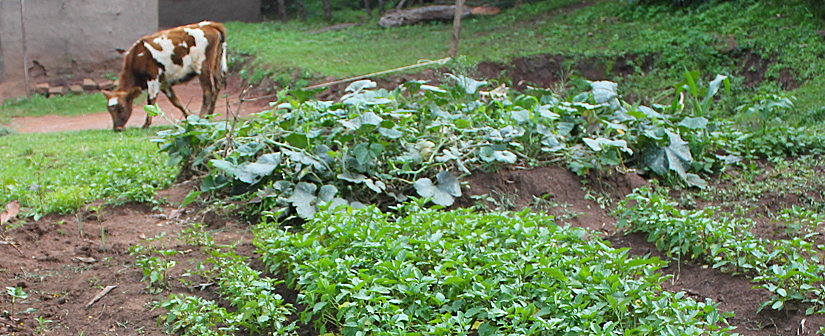
Understanding the socioeconomic feasibility and trade-offs involved in mixed crop-livestock farming systems — ones that specifically incorporate fruit and vegetable crops — is the focus of a new call for concept notes.
The Horticulture Innovation Lab is offering a grant up to $750,000 over three years to support a research project in integrated animal-horticulture systems. Sept. 19, 2016 is the deadline for brief concept notes, submitted by U.S. university researchers.
The research should be focused on the needs of smallholder farmers in developing countries that are part of Feed the Future, with priority given to Cambodia, Nepal and Rwanda.
“We are hoping to attract researchers from a range of disciplines — sociologists, economists, livestock specialists, and agriculturists — who have experience working in this area, even if not specifically with horticultural crops,” said Beth Mitcham, director of the Horticulture Innovation Lab. “The most important thing is to have a really strong concept or approach to investigating this topic and a strong, multidisciplinary team to do it.”
Integrating systems of livestock and horticulture
This is one of the Horticulture Innovation Lab’s first forays into livestock, animals or mixed systems as they relate to horticulture, gardening, and farming fruits and vegetables. The team consulted with the Feed the Future Innovation Lab for Livestock Systems (at the University of Florida) and the Feed the Future Sustainable Intensification Innovation Lab (at Kansas State University), to identify research priorities in this field.
“A farming system that integrates animals with fruit or vegetable crops can take many different forms around the world, based on varying local contexts,” explained Julia Jordan, UC Davis graduate student assistant who has worked on this request for proposals.
Research into integrated crop-livestock systems often focuses on feed or forage crops, such as grains, grasses or legumes, in combination with ruminant animals. This call for research proposals specifies that the crops include horticultural crops — specifically vegetables or fruits — but is open to a broader array of potential livestock animals, including poultry and rabbits. Fruits, vegetables and animal products are all potentially high-value commodities that can have a large impact on smallholder farmer income.
Jordan explained that previous research has identified ways that nutrient cycling between animal and crop systems can be environmentally beneficial, and that having a diverse diet of animal-source foods and plant-based foods offers positive nutrition impacts.
“What we’re looking at is how a farmer can realistically implement an integrated system that not only has these positive environmental impacts and positive nutrition potential, but is also economically feasible, culturally relevant, and profitable,” she said. “How are integrated animal-horticulture systems most feasible for smallholders?”
Teams that submit the top concept notes will be notified by Oct. 10 to begin developing a full research proposal.
Application details and the online submission form can be found at http://ucanr.edu/rfp/animal-horticulture-innovation.
More funding opportunities
With this new call for concept notes, the Horticulture Innovation Lab currently has three open opportunities for funding. The program previously announced two calls for research proposals, one related to tomato handling and marketing in Burkina Faso and another related to dried apricot handling and marketing in Tajikistan. Instructions for how to apply for all three of these grants are on the Horticulture Innovation Lab’s Funding Opportunities page.
The program also maintains a running list of researchers in a variety of countries who are interested in collaborating on future projects. With that list, researchers can both find a collaborator and also request their name and information be added to the list of potential partners.
Professionals with related expertise are also invited to become an external reviewer, to help the program select the strongest project proposals for funding. The Horticulture Innovation Lab continues to connect with new collaborators and strengthen its network to better advance horticultural research for international development.
The Horticulture Innovation Lab builds international partnerships for fruit and vegetable research to improve livelihoods in developing countries. This collaborative research program is led by a team at UC Davis, with funding from the U.S. Agency for International Development as part of Feed the Future, the U.S. government’s global hunger and food security initiative. More at http://horticulture.ucdavis.edu.
